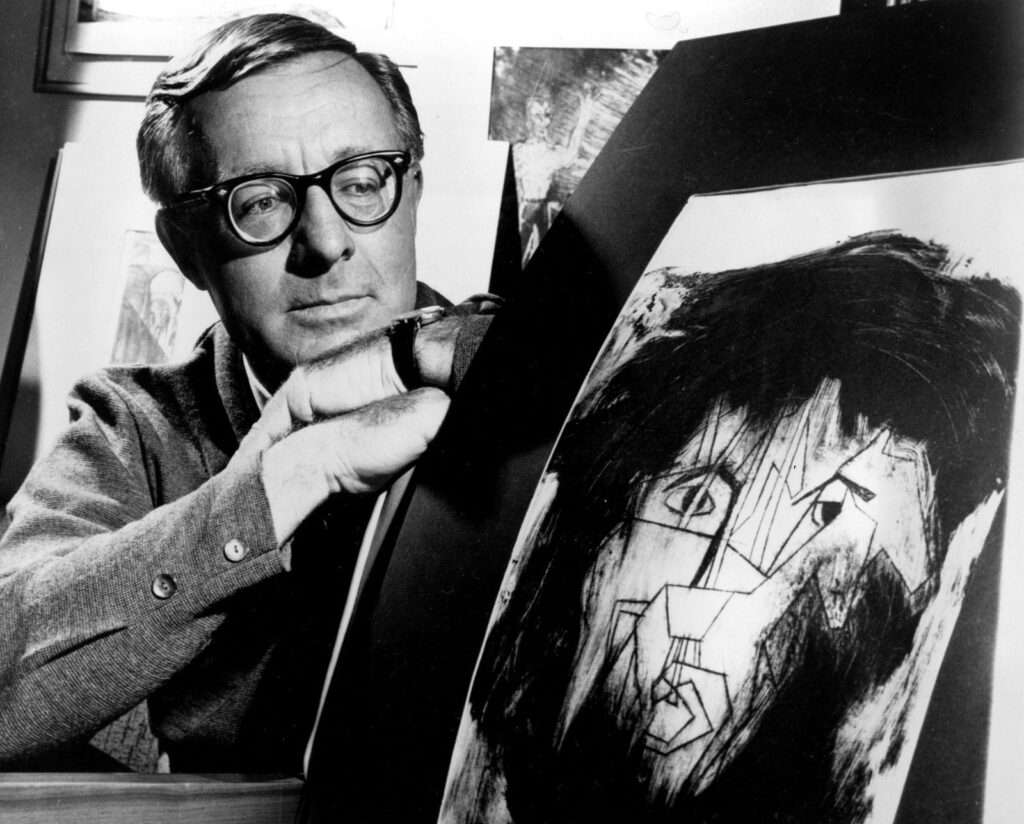Doubles, Ray Bradbury

Doubles
Bernard Trimble played tennis against his wife and when he beat her she was unhappy and when she beat him he was demon-possessed and double-damn madness unhappy, to put it mildly.
One summer, on a country road, in verdant Santa Barbara, Bernard Trimble was motoring along a farmland road with a beautiful and compatible lady of recent acquaintance in the seat beside him, her hair whipping in the wind, with her bright scarf snapping, and a look of philosophic tiredness on her face as from recent pleasant exertions, when an open roadster gunned past them going in the opposite direction, with a woman driving and a young man lounging beside her.
‘My God!’ cried Trimble.
‘Why’d you just cry “my God”?’ said the beautiful temptress at his side.
‘My wife just passed with the most terrible look on her face.’
‘What kind of look?’
‘Just like the one you have right now,’ said Trimble.
And he gunned the car down the road.
At an early dinner that night at the tennis club, with the sound of the tennis balls flying back and forth like soft doves, Trimble sat between two lit candles heartily devouring a bottle of wine. He growled when his wife finally arrived after much too long a shower and sat across from him wearing a spider-woven Spanish mantilla and a phosphorescent breath, like the breath of a twilight forest, sighing from her mouth.
He bent close to examine her chin, her cheeks, and her eyes.
‘No, it’s not there.’
‘What’s not there?’ she asked.
The look, he thought, of remembered and pleasant exertion.
She in turn bent forward, searching his face.
He leaned back in his chair and at last got the courage to say, ‘A strange thing happened this afternoon.’
His wife took a sip of wine and replied, ‘Strange, I was going to say somewhat the same thing.’
‘You first, then,’ he said.
‘No, go ahead. Tell me the strange thing.’
‘Well,’ he said. ‘I was driving along a country road outside town when a car passed, going the other way. There was a woman in it who looked very much like you. In the seat beside her, wearing an extravagantly rich white suit, his hair whipping in the wind and looking terribly and pleasantly tired, was the billionaire tennis-playing magnate Charles William Bishop. It was all over in a second and the car was gone. After all, we were traveling forty miles an hour.’
‘Eighty,’ said his wife. ‘Two cars passing each other in opposite directions at forty miles an hour, the aggregate is eighty.’
‘Oh yes,’ he agreed. ‘Well, wasn’t that strange?’
‘Indeed,’ said his wife. ‘Now let me tell you my strangeness. I was driving in a car this afternoon on a country road and a car passed at an accumulated eighty miles an hour and I thought I saw a man in it who looked very much like you. In the seat beside him was that beautiful heiress from Spain, Carlotta de Vega Montenegro. It was all over in a second and I was stunned and drove on. Two strange occurrences, yes?’
‘Have some more wine,’ he said quietly. He filled her glass much too full and they sat for a long while studying each other’s face and drinking the wine.
They listened to the soft sound of the dovelike tennis balls being struck and tossed through the twilight air; there seemed to be a lot of people out on the courts, enjoying themselves.
He cleared his throat and at last picked up a knife and began to run its edge along the tablecloth between them.
‘I think,’ he said, ‘this is the way we solve our two strange problems.’
With his knife he scored a long rectangle in the cloth and cut across it so that it resembled a metaphorical tennis court on the table.
Trimble and his wife looked across the net at the figures of Charles William Bishop and Carlotta de Vega Montenegro walking away, shaking their heads, their shoulders slumped in the noonday sun.
His wife lifted a towel to touch his cheek and he lifted one to touch hers.
‘Well done!’ he said.
‘Bull’s-eye!’ she said.
And they looked into each other’s face to find a look of tired contentment from recent amiable exertions.
The End
